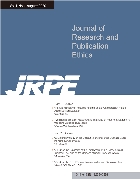 E-ISSN : 2733-7146
E-ISSN : 2733-7146
Vol.5 No.1
Abstract
Purpose: Compared to the research results that have achieved remarkable growth, research ethics problems that threaten the quality of research. This issue appears not only in Korea but also in research societies worldwide where research competition has risen This study attempted to prepare improvements and institutional implications to establish research ethics in the research field. Research Design, data and methodology: This study examined total 26 prior studies to examine the current status of aviation tourism research ethics in the literature reviews for the finding section. The procedure of data obtaining included the elimination process to screen dissertation papers, conference papers, and internet sources. Results: Researchers must have an institutional mechanism to publish papers after completing education. Research ethics education programs suitable for aviation tourism research should be developed and detailed and clear guidelines for research ethics should be provided. This can prevent research irregularities. Conclusions: It is necessary to create a clear research ethics education for the spread of positive research ethics on aviation tourism researchers. Develop research ethics education and complete long-term compulsory education. Establish a research culture that requires compulsory completion of research education. It is necessary to support continuous education and learning through various research ethics methods.
Abstract
Purpose: This study seeks to discuss research ethics, not only the academic honesty and sincerity that researchers who study aviation services academically should have, but also the direction of the moral aspects that are fundamentally required as researchers. Additionally, this study seeks to examine the realistic problems of research related to the aviation service industry, a field of social science. Lastly, focusing on research ethics in the aviation service field, we will look at the theoretical background and the problems in the actual research field, and draw implications based on this. Research design, data and methodology: This study conducted an exploratory study through a selection process based on research ethics topics and research ethics related to the aviation service industry. Results: Efforts to systematize research ethics in research areas related to the aviation service industry, which is a field of social science, require efforts to expand the scope of systematization of research ethics related to the aviation service industry by referring to systemization efforts in other academic fields. In addition, specific systemization efforts will be needed through cooperation between universities, research institutes, and academic organizations. Also, concrete systematization efforts will be needed through cooperation between universities and academic organizations
Abstract
Purpose: Since 2006, social, ethical, and institutional options have been attempted in Korea to establish research ethics; however, the effectiveness of these attempts has not been thoroughly examined. Studies have been conducted abroad to determine the timeliness of social, ethical and institutional alternatives, such as the adoption of laws governing research ethics, the improvement of research ethics education, the bolstering of systems, the introduction of incentive programs, and the creation of social environments that support research ethics. Research design, data, and methodology: Specific facets of research misconduct or research ethics must be investigated and verified. Aspects of moral growth at the person level must be investigated via research ethics and research ethics education. Results: There is an increasing need for the general public to define and uphold research ethics as the impact of research findings on society grows. Researchers can boost their confidence in their ethical judgments and actions by being aware of research ethics. This may lead to confidence in their capacity to make morally sound decisions. Conclusion: By doing this study, the researcher confirmed that ethically correct behavior can lead to and realize self-growth. Researchers may be more interested in and dedicated to their work when they feel that their research might help them mature and develop ethically.
Abstract
Purpose: To prevent and respond to youth sexual problems that are becoming more serious with digital development, this study sought to develop a sex education program that applies gamification as an effective method for youth who are digital natives. Research design, data and methodology: To develop a sex education program for teenagers, elements of gamification were considered based on Dick and Kerry's teaching system design model. The learning content reflected UNESCO’s ‘Comprehensive Sex Education Guidelines’. In addition, it was designed to enable students to learn about ethics and morals from a social and emotional aspect. Results: A four-session distance learning sex education program was developed for first-year high school students. To learn about gender sensitivity, sexual relationships, sexuality, and healthy sexual behavior, we developed a story that reflects the mission and quest for sex education. It included leaderboards, time limits, and levels, and also utilized mechanics such as points and items. Edutech tools include video content, Google Sheets, Zoom, Padlet, and Mentimeter. Conclusions: This study aims to improve learning effectiveness, satisfaction, and immersion by developing a sex education program for youth using gamification that promotes active learner participation and motivation.













